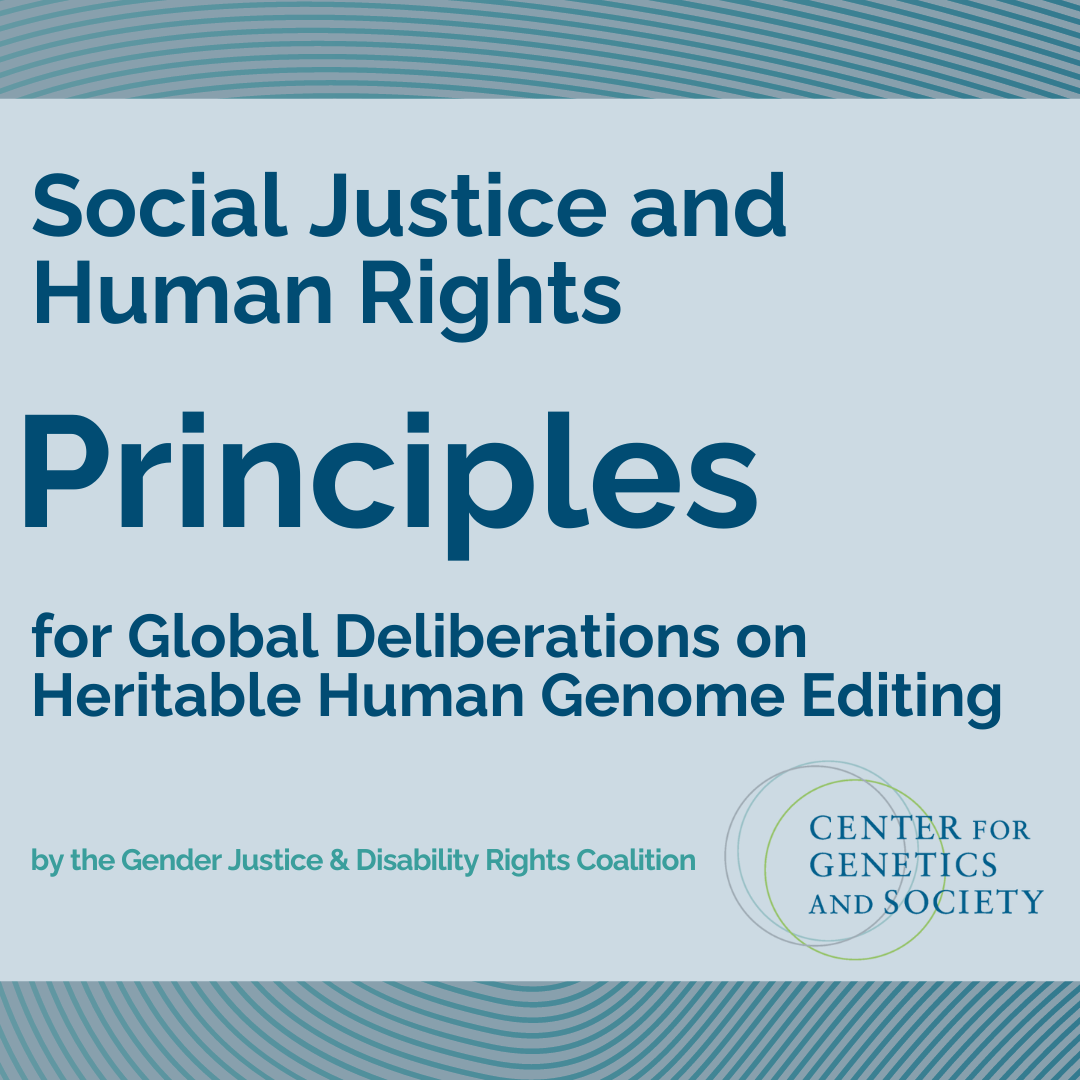Groundbreaking Social Justice Principles on Heritable Human Genome Editing

Groundbreaking Social Justice Principles on Heritable Human Genome Editing Released by International Coalition of Advocates and Scholars
Endorsed by 70+ Individuals and Organizations
An international coalition of scholars, advocates, and social change organizations today released Social Justice and Human Rights Principles for Global Deliberations on Heritable Human Genome Editing. This document is the first to explicitly center gender justice, disability rights, and human rights in the high-stakes deliberations on the potential use of heritable human genome editing – that is, altering the DNA of embryos or gametes to result in genetically modified children.
Five years ago, the first CRISPR babies were born due to the actions of one reckless scientist. While his dangerous work was condemned globally, a small circle of elite scientists has continued to push for allowing heritable genome editing experiments.
“There has been plenty of high-profile discussion by scientists and ethicists, but nothing like these principles, which treat heritable genome editing as a social justice issue,” said Katie Hasson, Associate Director of the Center for Genetics and Society. “The perspectives of civil society are sorely needed in these conversations, especially given the risks posed to society and repeated calls for broad and inclusive public debate.”
The eleven principles are based in intersectional social justice perspectives and intended to guide policy making and public engagement on heritable genome editing. They were developed by the Gender Justice and Disability Rights Coalition on Heritable Genome Editing, a group of 16 scholars, advocates, and organizations from 10 countries, convened by the Center for Genetics and Society (CGS). The Principles have been endorsed by 70+ individuals and organizations from around the world.
“When it comes to issues such as climate change, abortion, and immigration, we fully expect leadership from social justice organizations. But when we consider CRISPR and other biotechnologies, their perspectives are not represented. This coalition came together to change that,” said Emily Galpern, CGS consultant and coordinator of the Coalition. “We can only address the risks that heritable genome editing poses to society as a whole, and to historically marginalized groups in particular, by bringing social justice perspectives to the fore.”
The Principles call on governments to prioritize social justice and human rights in policy related to heritable genome editing, declaring: “It is essential to apply the frameworks of gender, disability, racial, reproductive, economic, environmental, and LGBTQ rights and justice, human rights, Indigenous sovereignty, and the rights of children and future generations in all policy concerning heritable human genome editing. Our future depends on it.”
The Principles lay out a bold and inspiring vision for a fair and inclusive future for all. They ground the Coalition’s claim that there is no argument for pursuing heritable genome editing that would align with these feminist, anti-eugenic, and human rights principles.
“We want policymakers and the public to know that heritable genome editing carries high stakes for society. Considering its societal impacts is equally as essential as discussing safety or ethics,” said Isabelle Bartram, Program Director for Gen-ethisches Netzwerk e.V. (Gen-ethical Network), a German nonprofit based in Berlin and an organizational member of the Coalition.
The Coalition will now develop model policies grounded in the principles for governing heritable human genome editing that can be adapted by international, national, or regional bodies.
####
Access a summary or the full text of the Social Justice and Human Rights Principles for Global Deliberations on Heritable Human Genome Editing.
For more information, please contact Katie Hasson (khasson@geneticsandsociety.org) or Isabelle Bartram (isabelle.bartram@gen-ethisches-netzwerk.de).
The Center for Genetics and Society is a non-profit organization that brings social justice and human rights to the center of public and policy discussions about human genetics and assisted reproduction.



